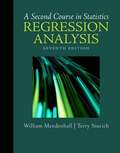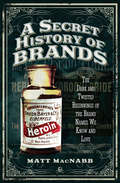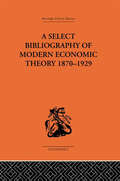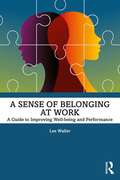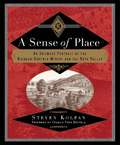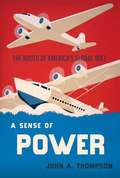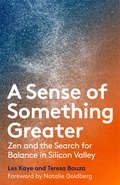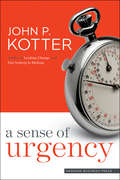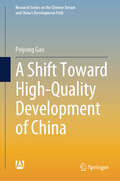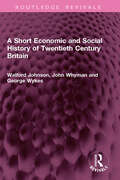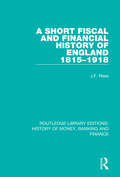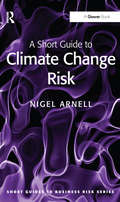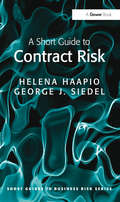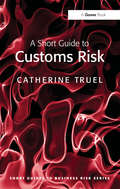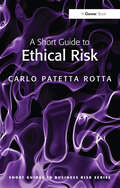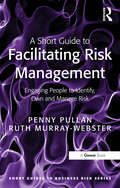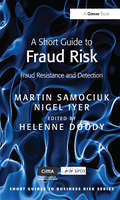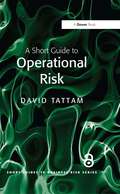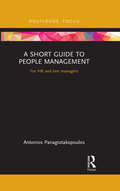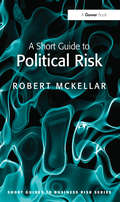- Table View
- List View
A Second Course In Statistics: Regression Analysis
by Terry Sincich William MendenhallA Second Course in Statistics: Regression Analysis, Seventh Edition, focuses on building linear statistical models and developing skills for implementing regression analysis in real situations. This text offers applications for engineering, sociology, psychology, science, and business. The authors use real data and scenarios extracted from news articles, journals, and actual consulting problems to show how to apply the concepts. In addition, seven case studies, now located throughout the text after applicable chapters, invite readers to focus on specific problems.
A Secret History of Brands: The Dark and Twisted Beginnings of the Brand Names We Know and Love
by Matt MacNabbThe true—and often shocking—stories behind some of the biggest names in business. We live our lives immersed in name brand products. What most of us don't know is that the origins of many of the most well-known and beloved brands in the world are shrouded in controversy, drug use, and sometimes even blatant racism.A Secret History of Brands cuts through the rumors and urban legends and paints a picture of the true dark history of famous brands, like Coca-Cola, Hugo Boss, Adidas, Ford, Bayer, Chanel, and BMW, among others. Learn about: the mystery of the cocaine content of Coca-Colathe Hitler-Henry Ford connectionwhy Bayer is famous for aspirin, but began their journey with Heroinhow Kellogg's Corn Flakes were crafted to deter sexual arousaland more
A Select Bibliography of Modern Economic Theory 1870-1929
by Harold E. BatsonA bibliography of this kind has long been needed. The book is clearly and accurately printed and well arranged." Times Literary Supplement. The scope of the bibliography is economic theory between 1870-1929, the heyday of the neo-classical revolution. The first part of the work is a series of select bibliographies of the different branches of theory. The second part covers a series of bibliographies of the works of key authors. * Bibliography covers American & English publications and German, French and Italian sources. * Subjects covered include: International Trade, Risk, Supply & Demand, Competition & Monopoly, Taxation and Public Expenditure.
A Self-Assessment Library: Insights in Your Skills, Abilities and Interests (second edition)
by Stephen P. Robbins"The Self-Assessment Library 2.0 has been created to help you to learn more about yourself so that you might become "enlightened." It draws on numerous instruments that have been developed by behavioral researchers that tap into your skills, abilities, and interests. This new edition has eight instruments that were not included in the first version; and I deleted four from the first edition that user feedback indicated were not very effective. Additionally, in response to user comments, the interpretation sections have been expanded. They now describe underlying concepts in greater detail and provide more elaborated discussions of what results mean. Here's a summary of changes you'll find in this second edition: - Four tests have been deleted and eight new ones added. - A matrix for relating tests to management and OB topics has been added. - Tests which assume current working experience are now identified. - Approximate quantitative cut-off scores, when not included by the tests' authors, have been provided to help students better understand the meaning of their results. - Where appropriate, remedial actions or references have been suggested to help students improve areas of weakness. "This Library of behavioral questionnaires has been designed to supplement a wide range of college courses. These include: Introduction to Management, Organizational Behavior, Supervision, Interpersonal Skills, Introduction to Business, Careers in Business, Industrial and Organizational Psychology, and Social Psychology. It works best when questionnaires are completed separately (rather than doing the whole set at one time) and when they're completed in sync with text readings on complementary topics."
A Sense of Belonging at Work: A Guide to Improving Well-being and Performance
by Lee WallerA sense of not belonging, that we are not accepted or valued at work can be enormously detrimental to our psychological well-being and sense of self, and can impact engagement, motivation and performance. Based on extensive research, this accessible and practical book helps leaders understand the implications of belonging on our well-being and performance and equips them with the insight and tools to ensure their employees have a sense of belonging at work, through: establishing connections and developing meaningful relationships, identifying and leveraging values and strengths, developing their awareness of diversity and unconscious bias, fostering a psychologically safe environment in which all can speak up, developing an inclusive leadership mindset and challenging negative thinking patterns. The strategies and tips provided will allow readers to ensure they too have a strong sense of belonging at work. This book is designed for leaders in organisations who are responsible for the performance and well-being of their teams and for anyone who has experienced a sense of not belonging and wants to understand how to develop a sense of belonging now and in the future. It will also be of value to HR professionals and coaches, who are seeking to develop positive, inclusive workplaces.
A Sense of Place: An Intimate Portrait of the Niebaum-Coppola Winery and the Napa Valley
by Steven KolpanIn A Sense of Place, renowned wine expert and writer Steven Kolpan tells the story of how Francis Ford Coppola brought California's most distinguished and historic vineyard back to life. Gustave Niebaum's Inglenook Estate, started in 1879, was one of the Napa Valley's first established vineyards and the birthplace of its premium wine industry. Generations after Niebaum's death, the vineyard was sold to Heublein, the wine and spirits monolith, who broke up the land and changed the Inglenook brand from a premium, connoisseur wine to a mass-market jug wine. In 1975, Francis Coppola bought the Niebaum residence and the surrounding estate. Along with the original estate's reputation, he also brought back some of its original workers, including Rafael Rodriquez, who, in h is late seventies, now serves as the vineyard manager and historian. Coppola overcame naysayers, red tape, and financial turmoil to reestablish the winery as a defender of quality, producing wine under four different labels, including the revered wine Rubicon. In 1995, Coppola purchased the Inglenook Chateau and its adjacent vineyards, fulfilling his dream of reuniting the original Napa Valley estate. Kolpan's luscious, flavorful narrative is worth enjoying now and keeping for later.
A Sense of Power: The Roots of America's World Role
by John A. ThompsonWhy has the United States assumed so extensive and costly a role in world affairs over the last hundred years? The two most common answers to this question are "because it could" and "because it had to." Neither answer will do, according to this challenging re-assessment of the way that America came to assume its global role. The country's vast economic resources gave it the capacity to exercise great influence abroad, but Americans were long reluctant to meet the costs of wielding that power. Neither the country's safety from foreign attack nor its economic well-being required the achievement of ambitious foreign policy objectives. In A Sense of Power, John A. Thompson takes a long view of America's dramatic rise as a world power, from the late nineteenth century into the post-World War II era. How, and more importantly why, has America come to play such a dominant role in world affairs? There is, he argues, no simple answer. Thompson challenges conventional explanations of America's involvement in World War I and World War II, seeing neither the requirements of national security nor economic interests as determining. He shows how American leaders from Wilson to Truman developed an ever more capacious understanding of the national interest, and why by the 1940s most Americans came to support the price tag, in blood and treasure, attached to strenuous efforts to shape the world. The beliefs and emotions that led them to do so reflected distinctive aspects of U.S. culture, not least the strength of ties to Europe. Consciousness of the nation's unique power fostered feelings of responsibility, entitlement, and aspiration among the people and leaders of the United States. This original analysis challenges some widely held beliefs about the determinants of United States foreign policy and will bring new insight to contemporary debates about whether the nation should--or must--play so active a part in world politics.
A Sense of Something Greater: Zen and the Search for Balance in Silicon Valley
by Natalie Goldberg Les Kaye Teresa BouzaWelcome to Silicon Valley’s search for fulfillment and purpose beyond devices, money, and power. With worker stress at an all-time high, particularly in the fast-paced technology industry, it’s no surprise that Google, Salesforce, and Apple have adopted mindfulness and meditation into their workplace culture. Studies show mindfulness practice increases emotional intelligence, reduces stress, and enhances health and overall well-being. A Sense of Something Greater goes deeper than the current mindfulness trend, into the heart of Zen practice. For Les Kaye, Zen is more than awareness––it’s also “the continued determination to be authentic in relationships, to create meaningful, intimate, intentional bonds with people, things, and the environment.” Kaye’s teachings are paired with interviews with current tech employees and Zen practitioners, conducted by journalist Teresa Bouza. A Sense of Something Greater is an essential book for business leaders, mindfulness meditators, and Zen practitioners alike.
A Sense of Urgency
by John P. KotterMost organizational change initiatives fail spectacularly (at worst) or deliver lukewarm results (at best). In his international bestseller Leading Change, John Kotter revealed why change is so hard, and provided an actionable, eight-step process for implementing successful transformations. The book became the change bible for managers worldwide.Now, in A Sense of Urgency, Kotter shines the spotlight on the crucial first step in his framework: creating a sense of urgency by getting people to actually see and feel the need for change.Why focus on urgency? Without it, any change effort is doomed. Kotter reveals the insidious nature of complacency in all its forms and guises.In this exciting new book, Kotter explains:· How to go beyond "the business case" for change to overcome the fear and anger that can suppress urgency· Ways to ensure that your actions and behaviors -- not just your words -- communicate the need for change· How to keep fanning the flames of urgency even after your transformation effort has scored some early successesWritten in Kotter's signature no-nonsense style, this concise and authoritative guide helps you set the stage for leading a successful transformation in your company.
A Series of Unrelated Events
by Richard BaconHave you ever been stitched up to the national press by your best mate?Or unintentionally upset a band with a slip of the tongue on a live TV show?Or ruined a dinner party by transforming everything alcoholic into water?Hello. I’m Richard Bacon and this is A Series of Unrelated Events. All of the stories are true. All of them happened to me. I’ve made the mistakes so you don’t have to (you’re welcome). So now, if you should ever find yourself sobbing on top of a box of gherkins in the stockroom of a Mansfield McDonald’s… having a Twitter conversation with your mum while she’s pretending to be an illiterate dog… performing stand-up to an audience who are funnier than you are… or just letting down all of the children of Great Britain……you’ll know exactly what to do.
A Seventh Man: Migrant Workers in Europe
by John BergerA description of the exploitation of migrant workers in Europe during the mid 20th century.
A Shift Toward High-Quality Development of China (Research Series on the Chinese Dream and China’s Development Path)
by Peiyong GaoThis book focuses on the China’s economic strategy aiming to high-quality development in recent years. It is a paper collection of the author published since 2013. Under the basic framework of macroeconomic analysis, this book is divided into 7 chapters in accordance with the basic logic chain of "the new normal of economic development - the change of the main contradiction in society - the new development concept - the supply-side structural reform." It involves the hot topics around China’s economic reform toward high-quality development including supply-side structural reform, macro-control system, fiscal policy, cutting taxes and fees, etc.
A Shoppers’ Paradise: How the Ladies of Chicago Claimed Power and Pleasure in the New Downtown
by Emily RemusPopular culture assumes that women are born to shop and that cities invite their trade. But downtowns were not always welcoming to women. Emily Remus turns to Chicago at the turn of the last century to chronicle an unheralded revolution in women’s rights that took place not at the ballot box but in the streets and stores of the business district.
A Short Course in Intermediate Microeconomics with Calculus
by Roberto Serrano Allan M. FeldmanThis second edition retains the positive features of being clearly written, well organized, and incorporating calculus in the text, while adding expanded coverage on game theory, experimental economics, and behavioural economics. It remains more focused and manageable than similar textbooks, and provides a concise yet comprehensive treatment of the core topics of microeconomics, including theories of the consumer and of the firm, market structure, partial and general equilibrium, and market failures caused by public goods, externalities and asymmetric information. The book includes helpful solved problems in all the substantive chapters, as well as over seventy new mathematical exercises and enhanced versions of the ones in the first edition. The authors make use of the book's full color with sharp and helpful graphs and illustrations. This mathematically rigorous textbook is meant for students at the intermediate level who have already had an introductory course in microeconomics, and a calculus course.
A Short Economic and Social History of Twentieth Century Britain (Routledge Revivals)
by Walford Johnson John Whyman George WykesA Short Economic and Social History of Twentieth Century Britain (1968) overcomes the statistical complexities of the twentieth century by establishing long-term social and economic trends to provide a succinct analysis of Twentieth Century Britain. It looks at population, including age structure, population distribution and urban expansion; agriculture; industry and transport; overseas trade; industrial relations; employment and occupational structure; social policy; education; public finance; living standards; and changes in leisure activities.
A Short Fiscal and Financial History of England, 1815-1918 (Routledge Library Editions: History of Money, Banking and Finance #13)
by J.F. ReesThis book, first published in 1921, is intended to serve as an introduction to the study of the historical background of modern industrial and social questions. It deals with the evolution of English industrial conditions from the close of the Napoleonic War to the outbreak of the First World War. Particular attention is paid to social consequences and growth of opinion.
A Short Guide to Climate Change Risk (Short Guides to Business Risk)
by Nigel ArnellClimate change poses a risk to business operations and to markets, and a poor business response to this risk can lead to reputational damage, or worse. At the same time, climate change can bring opportunities for some businesses. In this addition to Gower’s series of Short Guides to Business Risk, Professor Arnell, one of the world’s leading experts in the field, reviews this critical area of risk posed to businesses and other organisations by climate change and considers how they can respond to this threat. A Short Guide to Climate Change Risk focuses on the impacts and consequences of climate change rather than on business use of energy or business and 'sustainability' issues. The author examines the advantages and disadvantages of different approaches to addressing these risks, with international case study examples. With chapters on the nature, science and politics of climate change, on the assessment and management of climate change risks, and recommendations for incorporating climate change risks into a Company Risk Management System, this concise guide serves the needs of business students and practitioners across a wide range of sectors, public and private.
A Short Guide to Contract Risk (Short Guides to Business Risk)
by George J. Siedel Helena HaapioSavvy managers no longer look at contracting processes and documents reactively but use them proactively to reach their business goals and minimize their risks. To succeed, these managers need a framework and A Short Guide to Contract Risk provides this. The foundation of identifying and managing contract risk is what the authors call Contract Literacy: a set of skills relevant for all who deal with contracts in their everyday business environment, ranging from general managers and CEOs to sales, procurement and project professionals and risk managers. Contracts play a major role in business success. Contracts govern companies' deals and relationships with their suppliers and customers. They impact future rights, cash flows, costs, earnings, and risks. A company's contract portfolio may be subject to greater losses than anyone realizes. Still the greatest risk in business is not taking any risks. Equipped with the concepts described in this book, business and risk managers can start to see contracts differently and to use them to find and achieve the right balance for business success and problem prevention. What makes this short guide from the authors of the acclaimed Proactive Law for Managers especially valuable, if not unique, is its down-to-earth managerial/legal approach. Using lean contracting, visualization and the tools introduced in this book, managers and lawyers can achieve legally sound contracts that function as managerial tools for well thought-out, realistic risk allocation in business deals and relationships.
A Short Guide to Customs Risk (Short Guides to Business Risk)
by Catherine TruelThe historic growth in world trade, large container ships and information technology have triggered profound changes in international trade. A few years ago, customs officers at the border were meticulously checking goods and documents before releasing a shipment to the trader. A business could be confident that a shipment that had cleared customs complied with all applicable regulations. Today, to reduce congestion and give the trade quick access to their goods, customs have introduced risk management principles and a large number of shipments clear customs automatically. Controls have moved from the border to the trader’s premises and it is during site visits that customs officers check the business compliance records. Moving from frontier checks to audit based controls has transferred a high level of responsibility and risk to the trader. It is now the duty of the trader to identify and report any error or irregularity and to keep an impeccable audit trail from initial quotation to receipt of payment. For the business, failing to provide satisfactory compliance records will result in delayed shipments and serious disruption in the supply chain. This will in turn impact on financial performance indicators such as Days in Inventory, Days Sales Outstanding and of course Cash Flow. The business will also have to endure in depth customs audits during which customs officers will inspect each step of the audit trail disrupting day-to-day business operation. Errors uncovered during these audits will yield heavy financial penalties and a customs debt. Ultimately, customs risk will impact on shareholders value. Customs and finance reporting should receive the same level of attention. However, if all companies check carefully their tax returns, only a few check their import or export declarations with the same scrutiny. Managing customs risk is often seen as a cost centre but it is also a source of competitive advantage. A sound customs management can reduce or remov
A Short Guide to Ethical Risk (Short Guides to Business Risk)
by Carlo Patetta RottaFollowing corporate scandals and the recent bankruptcy of large financial institutions, the public believes that one of the responsibilities of governments, regulators and corporate executives is to do business in compliance with basic ethical values. It is now acknowledged that there has been a general decline in ethical standards in the business world, perhaps due in part to a celebrity culture that overvalues wealth and shallow notions of 'success'. Ethics used to be discussed only by philosophers and academics, but it is now apparent to business leaders that companies wishing to survive into the future have to develop effective protection against exposure to 'ethical risk'. This Short Guide, written by a professional with diverse international experience in auditing and fraud prevention who has specialised in ethics-related issues, serves as a resource for all who need a more complete view of the subject and practical guidance to inform their daily business decisions. Providing an overview of the theories of ethics that bear on today's business world, from Adam Smith's liberalism to stakeholder theory, the Guide explains the human behaviour that gives rise to fraud and corruption in terms of a "fraud triangle theory" according to which unethical behaviours happen when three risk components - psychological pressure, opportunity and rationalisation - are present. 'Pressure' is linked to the unfortunate superstar culture, while 'opportunity' can be reduced through application of adequate control mechanisms and corporate governance models. 'Rationalisation' has to do with the ability of an honest individual to justify a dishonest action in his own eyes. Ethics bears directly on this component and an ethical approach can prevent such self-justification. The adoption of appropriate company cultures and corporate governance models, the selection and retention of ethically sound staff and implementation of fair incentive systems are all advocated by the author, who describes the roles within an organisation of the Audit Committee and the Compliance Function. Additionally, the Guide offers a range of tools that can be applied by practitioners in the field, such as codes of conduct, compliance programmes, whistle blowing procedures and risk management processes.
A Short Guide to Facilitating Risk Management: Engaging People to Identify, Own and Manage Risk (Short Guides to Business Risk)
by Penny Pullan Ruth Murray-WebsterMany organisations have spent small fortunes to set up risk processes and supporting tools which then fail to deliver the expected value. This is because rational processes don't work well when trying to get groups of people to agree what is risky, why and what to do about it. If you need to make sound decisions in important but risky situations; work with groups to identify, prioritise and respond to risks, deliver value and, along the way, ensure the credibility of the process and the resilience of your organisation, A Short Guide to Facilitating Risk Management is for you. It sets out a very practical approach to how the risk management process can deliver value through effective facilitation. It brings together Ruth Murray-Webster's expertise in the human aspects of risk and risk attitude and Penny Pullan's wide experience of the facilitation of project workshops to cover five main areas: avoiding pitfalls - how to makesure you are better prepared, better able to use your knowledge with groups and better able to avoid unsupported or skewed results; an understanding of risk management - to refresh your own knowledge and provide the basis for knowledge and ideas you can share with your group(s); understanding your role - whether you are a full-time facilitator or a line manager with the need to improve risk management, you'll learn the skills you need and gain an understanding of how best to develop them; tried and tested tips for each step of the risk management process - proven practices showing how you can use the right mix of workshops, small groups and individual work to keep people engaged and get results; running risk workshops - the whole area of making workshops work. This book is illustrated with practical examples from the authors' experience and their findings from interviews and surveys to help you get the best from your groups when they're working together, both face-to-face and virtually.
A Short Guide to Fraud Risk: Fraud Resistance and Detection (Short Guides to Business Risk)
by Martin Samociuk Nigel IyerA Short Guide to Fraud Risk is for: * anyone who needs to better understand fraud risks, either company-wide, or in a specific business unit; * directors and managers who would like to add value by building fraud resistance into their organization and to demonstrate to shareholders, regulators or other stakeholders that they are managing fraud risks, rather than just reacting to incidents; * regulators, auditors and compliance professionals who need to assess the effectiveness of an organisation's fraud prevention measures. The book gives a concise but thorough introduction to the risk of fraud based on a six-element strategy. It includes practical steps to assess and treat fraud risks across an organisation, including those relating to executive directors. It also provides practical steps to develop fraud awareness across an organisation and how to implement an effective fraud detection and incident management program. The application of the principles is illustrated with example documents and numerous case studies aimed at assisting the reader to implement either individual elements or a complete fraud risk management strategy.
A Short Guide to Operational Risk (Short Guides to Business Risk)
by David TattamThere is a growing awareness across both public and private sectors, that the key to embedding an effective risk culture lies in raising the general education and understanding of risk at every level in the organization. This is exactly the purpose of David Tattam's book. A Short Guide to Operational Risk provides you with a basic yet comprehensive overview of the nature of operational risk in organizations. It introduces operational risk as a component of enterprise wide risk management and takes the reader through the processes of identifying, assessing, quantifying and managing operational risk; explaining the practical aspects of how these steps can be applied to an organization using a range of management tools. The book is fully illustrated with graphs, tables and short examples, all designed to make a subject that is often poorly understood, comprehensible and engaging. A Short Guide to Operational Risk is a book to be read and shared at all levels of the organization; it offers a common understanding and language of risk that will provide individual readers with the basis to develop risk management skills, appropriate to their role in the business. The Open Access version of this book, available at http://www.taylorfrancis.com, has been made available under a Creative Commons Attribution-Non Commercial-No Derivatives (CC-BY-NC-ND) 4.0 license.
A Short Guide to People Management: For HR and line managers (Routledge Focus on Business and Management)
by Antonios PanagiotakopoulosThere is a plethora of information available for busy HR practitioners but what they really need is a clear, concise and comprehensive analysis of the theory and practice of people management within contemporary organizations. Indeed, much has been written about Human Resource Management and Organizational Behavior, which rigorously explores each scientific field, yet there is a lack of an integrated examination of both fields. The author begins by describing the new world of business and management, which is characterized by continuous change and precarious employment. He examines the individual at work, group behavior, people resourcing, performance and development and the employment relationship and he concludes with a look at organizational change; i.e. the nature of the sorts of changes that take place in companies of all sizes and how the process of organizational development can be managed effectively through people management. This guide provides a thorough examination of the key areas of organizational psychology and people management and offers an easy to digest theory on each topic coupled with the latest empirical evidence. All the core theories of HRM and OB are presented in a methodical and critical manner, appealing to time-starved professionals who wish to acquire a detailed overview of people management rapidly. Throughout the book, several suggestions will be made to managers for ways of applying various HR theories to the workplace. The reader will uncover how to manage people but won’t be offered prescriptions because the best way of managing people depends on the context.
A Short Guide to Political Risk (Short Guides to Business Risk)
by Robert McKellarIn a competitive and increasingly internationalised business world, many companies rely on the high risk/reward ratio of operating in unstable areas. Those companies willing to engage in emerging or developing countries can often be exposed to a politically volatile environment over which they have little control. Political risk, therefore, is one of the most hazardous challenges that an international business can face. In A Short Guide to Political Risk you will find a business-centric introduction to political risk that will familiarise international managers with the concept and accelerate the learning curve towards proficient and coherent political risk management. Robert McKellar explores: the key political risks that companies have faced in the recent past, and current trends in the evolution of the political risk landscape; the concept of political risk and its constituent elements; models and approaches for assessing political risk; the principal options for managing political risk, and suggestions for organisational structures to ensure a coherent and consistent approach; as well as wider issues that a company needs to consider in developing its own attitude and philosophy on political risk. A Short Guide to Political Risk is an essential introductory guide for risk managers and for all senior managers concerned with their organisation's global performance and reputation.
